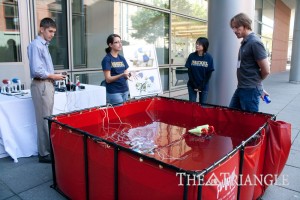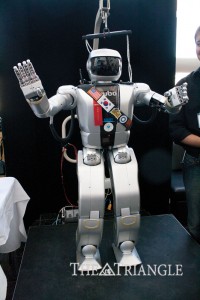Drexel hosted the National Science Foundation’s Science, Technology, Engineering and Mathematics conference Sept. 19. to introduce high school teachers to better education methods in science, technology, engineering and math.
The conference, called “STEM Smart: Lessons Learned from Successful Schools,” was an all-day educational event comprised of exhibits, panel discussions and informational speeches centered around the NSF’s report, “Successful K-12 STEM Education: Identifying effective approaches in science, technology, engineering and mathematics.”
 Congressman Frank Wolf of Virginia requested the report from NSF in 2010 in an effort to increase America’s competitiveness in the global economy, according to a statement made by Wolf on his website. American students were recently ranked near the bottom of Western nations for STEM achievement.
Congressman Frank Wolf of Virginia requested the report from NSF in 2010 in an effort to increase America’s competitiveness in the global economy, according to a statement made by Wolf on his website. American students were recently ranked near the bottom of Western nations for STEM achievement.
“One of the main goals of the conference was to get the STEM community talking about it,” Holly Burnside, graduate and research programs manager of the College of Engineering, said.
Pennsylvania Congressman Chaka Fattah arranged for the conference to be held at Drexel in recognition of the university’s leading role in STEM education.
 “As a university committed to science and technology, Drexel considers STEM education vital to our mission in all of its dimensions. K-12 STEM education is a driver for research, for scholarly activities, and for community initiatives. STEM education is also a national issue that has clearly been embraced by greater Philadelphia,” Drexel President John A. Fry said in his welcome speech.
“As a university committed to science and technology, Drexel considers STEM education vital to our mission in all of its dimensions. K-12 STEM education is a driver for research, for scholarly activities, and for community initiatives. STEM education is also a national issue that has clearly been embraced by greater Philadelphia,” Drexel President John A. Fry said in his welcome speech.
In addition to over 20 exhibits lead by NSF representatives to demonstrate some of the best STEM methods for education, Drexel presented its own effective STEM projects.
SeaPerch, an underwater robotics competition that Drexel hosts with the Navy each year for high school and middle school students, had a pool set up to demonstrate some of the underwater robots.
Members of the College of Engineering’s Music and Entertainment Technology Laboratory, under the direction of Youngmoo Kim, also demonstrated some of their work. In addition, the Drexel Autonomous Systems Lab showed their Jaemi Hubo humanoid robot.
Subra Suresh , the director of NSF, announced the importance of STEM education in his speech, “Innovate to Educate: Science, technology, engineering and mathematics learning for tomorrow’s world.”
“In Asia, 21 percent of all the college graduates major in engineering. In Europe, 13 percent of all the college graduates major in engineering. In the United States, 4.5 percent of all the college graduates major in engineering. That’s a very worrisome sign,” Suresh said.
Suresh explained that a generation ago, the U.S. was No. 1 in the world in terms of the fraction of the population with a college degree. But within one generation, the country dropped from first place to eighth.
Additionally, Suresh stated that proper STEM education in grades K-12 is the foundation for the number of kids going to college.
“Today’s event is just the beginning. The next steps will inevitably involve broad dissemination of best practices and also discussion on what is the best way to implement the great ideas that are known to work and the great ideas that we may not have tried yet,” Suresh said.
Panel discussions were also held to report examples of successful STEM programs across the United States.
“If we’re teaching [high school students] any science at all, we’re teaching them that science is something that you get to after you’re finished preparing for the reading and math tests. We’re never going to innovate our way forward if that’s the way we’re teaching,” Chris Lehmann, founding principal from the Science Leadership Academy in Philadelphia, explained.
“We have to understand, especially in our schools that contain high numbers of socio-economic need children, that STEM education has to be about not just training for a job but [about] citizenship development. There is not a problem that we face today in our society that we should not be facing a STEM lens on,” Lehmann added.
Panels also involved discussion on out of school learning, making science education a reality, and the role of common standards in STEM education.

